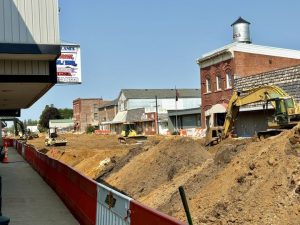By Joshua Schuetz

The City of LeRoy faced a major challenge this year as the Highway 56 construction project tore through its downtown, severely affecting local businesses. The construction, which began in April, disrupted the usual flow of traffic through the small town.
“All the businesses along Highway 56 were impacted,” said Allison Whalen, a CEDA team member who serves the City of LeRoy. “It’s especially difficult because Highway 56 is not only the main street but also the only way to get from one side of town to the other.”
The town’s business corridor—home to a variety of retailers and services, including a lumberyard, a grocery store, a hardware store, a chiropractor, and two restaurants—were all affected by the project. In an effort to help mitigate the impact, the LeRoy EDA, with Whalen’s guidance, implemented a microloan program offering up to $250 in forgivable loans to help businesses cover advertising costs during construction. “We tried to be proactive,” Whalen said. “But when they started Phase II of the project early, it threw us for a loop.”
Realizing that more support was needed, local leaders, including Mower County Commissioner Polly Glynn, took action. “Commissioner Glynn came to our EDA meeting in September, wanting to understand the full effect of the construction. She took that information back to Mower County, and they developed a forgivable loan program specifically for LeRoy businesses impacted by the construction.” Mower County Administrator Trish Herron spoke to the inherent need for the financial relief that Mower County is providing to LeRoy. “Successful businesses in the county lift everyone. Losing a business, especially in a small town, has cascading impacts. It means people can’t access goods or services in their hometowns and it is a loss of stabilizing tax revenue”, Administrator Herron said. “There are foundational economic reasons for the county to intervene to provide gap financial support during an extended time of business interruption. But at the end of the day, local business owners are also our neighbors. It is heart breaking to see Mainstreet businesses on the verge of closing while the MnDOT builds a new Mainstreet.”
Mower County swiftly allocated $80,000 for emergency relief, with businesses able to apply for loans between $5,000 and $10,000. “Aaron Keenan from the Development Corporation of Austin (DCA) quickly created the criteria and process for the forgivable loan program and drove to LeRoy to meet with eight businesses in one day to help them get their applications in,” Whalen said. “We encouraged them to bring their stories and data on how the construction affected their business.”
As Highway 56 nears completion, Whalen and the local business community remain hopeful that the aid will provide much-needed relief. However, the long-term impact of the construction is still a concern. “When you disrupt people’s habits, they may not come back,” Whalen noted. Some businesses have adapted by utilizing back entrances or alleyways, but even that solution has brought new challenges. “These alleys aren’t meant for heavy traffic, and diverting customers there isn’t ideal.”
Despite the hurdles, Whalen is confident that LeRoy’s businesses will weather the storm, especially with the assistance from the DCA and Mower County. “We’re doing our best to make sure everyone gets the help they need,” Whalen said.
Whalen emphasized that having an Economic Development Authority and a CEDA representative in LeRoy played a crucial role in the response to the construction crisis. “Because LeRoy has a CEDA representative, we were able to facilitate a quick turnaround by working with the DCA, getting the businesses the face-to-face support they needed and then distributing the funds within days. It’s been a great joint effort.”
